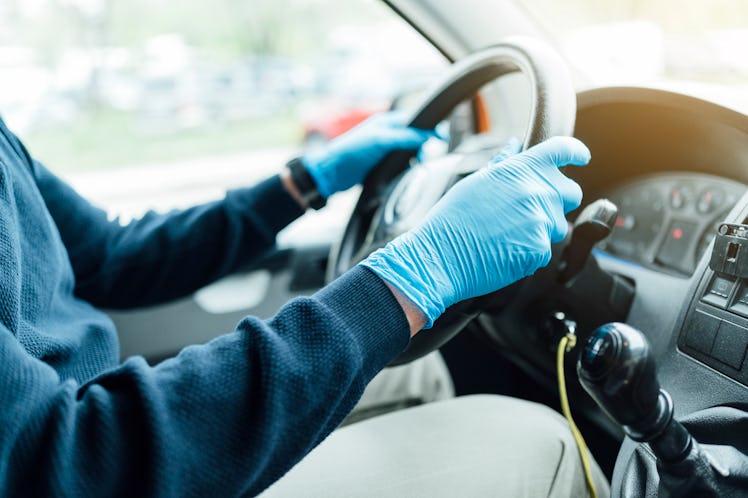
Here's What To Know About Coronavirus & Allergy Season, So You Don't Freak Out
As the number of confirmed coronavirus cases across the United States continues to increase, people are understandably worried any time they feel sick. And as the weather gets warmer, allergy season is starting up in large swaths of the United States, making things even more confusing. However, you don't need to call your doctor the minute you sense a tickle in your throat. Here's what to know about coronavirus versus allergies, because you don't want to mix these two up.
According to the World Health Organization (WHO), fever, dry cough, and fatigue are a few of the most common symptoms of the coronavirus. Symptoms can also include nasal congestion, diarrhea, body aches, or a sore throat. Given this range of symptoms, the coronavirus is pretty distinct, but according to NPR, sometimes these symptoms can overlap with those brought on by seasonal allergies, such as nasal congestion, itchy eyes, headaches, and sneezing.
Dr. Timothy Craig, a professor of medicine and pediatrics at Penn State University, tells Elite Daily that itchy eyes and nose, as well as sneezing, can be key indicators that distinguish seasonal allergies from the coronavirus. It is also useful to look back on past years, Craig says, to see if you had allergy symptoms in the past. For example, if you're experiencing itchy or watery eyes, persistent sneezing, or other cold symptoms, think back to the same timeframe last year. "If people can reflect back on last year and see if they had those similar symptoms last year, that should give them a good idea of whether or not it’s allergies instead of a viral infection," Craig says.
According to Healthline, another key indicator of the coronavirus is the presence of a fever. A seasonal allergy on its own is unlikely to cause a fever, per Healthline, but it could make you more vulnerable to bacterial or viral infections, which do cause fevers. That's why Craig recommends being proactive about taking allergy medications early if you have experienced allergies in the past. "Even when you don’t have that dilemma — is this virus or is this allergies? — it’s better to always start your medication before the season, because if you are proactive and preempt your symptoms, you get better control," Craig says.
According to The Cut, allergy medications don't necessarily work if you have a cold, the flu, or the coronavirus, so taking these medications early in the allergy season may help you determine if you're actually sick. Craig also recommends trying over-the-counter allergy medications such as antihistamines if you're experiencing potential allergy symptoms, but you should call your doctor if those don't alleviate your symptoms.
People with allergies may also be more vulnerable to contracting the virus due to respiratory system fragility, as CNN reported. According to Craig, allergies can cause inflammation in your airways that can in turn weaken your immune system and make it easier to catch a virus, although he notes that there is still no conclusive evidence about any links between seasonal allergies and the coronavirus. Seasonal allergies may also cause you to rub your eyes and nose more than usual, Craig adds, and if you're touching other things after doing so, you may also have a greater chance of transmitting the virus to others.
Experts tell Elite Daily that one of the biggest misconceptions about the coronavirus is that it's just like the flu or a common cold. This misconception is particularly dangerous because people who have contracted the coronavirus could be spreading it without even realizing it. If you are experiencing any of the symptoms of coronavirus detailed by the Centers for Disease Control and Prevention (CDC) and the WHO, calling your health care provider is your safest bet. According to the CDC, you should seek immediate medical attention if you start experiencing breathing difficulties, pain or pressure in your chest, confusion, or a bluish face, because those could be emergency indicators of the coronavirus.
You should also consider wearing a mask to avoid transmitting illness to others, and wearing some sort of eye protection — such as glasses — may help you refrain from touching your eyes. According to the CDC, everybody should regularly wash their hands with soap and water for at least 20 seconds, in addition to disinfecting high-touch surfaces, staying home and self-isolating when sick, and adhering to social distancing recommendations.
If you think you’re showing symptoms of coronavirus, which include fever, shortness of breath, and cough, call your doctor before going to get tested. If you’re anxious about the virus’s spread in your community, visit the CDC for up-to-date information and resources, or seek out mental health support. You can find all Elite Daily's coverage of coronavirus here.
Experts cited:
Dr. Timothy Craig, professor of medicine and pediatrics at Penn State University